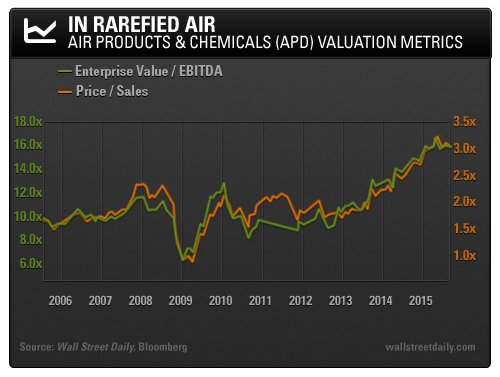On Wednesday, a journalist asked Federal Reserve Chair Janet Yellen an important question: Could she give any assurances to savers who think the Fed is never going to raise short-term interest rates?
Chair Yellen, almost grinning, answered: “I can’t give an ironclad promise…”
She went on to say that the appropriate conditions for a rate increase should be in place later this year, but stressed throughout the press conference that the pace of rate increases would be slow.
But after 52 consecutive regularly scheduled Federal Open Market Committee (FOMC) meetings without a rate hike, do we really need promises that the Fed will move at a glacial pace?
Basically, the markets are still being coddled. That’s a problem, because the incessant easy-money policies are creating massive distortions. For instance, I’m seeing some dividend-paying stocks trading at ludicrous valuation multiples…
Air Products and Chemicals Inc (NYSE:APD) is a prime example.
APD’s enterprise value-to-EBITDA multiple has eclipsed 16x this year, and its price-to-sales ratio has risen above 3.0x. For comparison’s sake, the median EV/EBITDA multiple in the S&P 500 is 12.2x, and the median P/S is 2.2x.
As you can see below, APD’s valuation has risen to its highest level in the past 10 years.

But no one really cares about valuation in this low-rate environment, as long as a company has a long history of raising its dividend payment.
Air Products, for instance, has increased its dividend for 33 consecutive years, making it a Dividend Aristocrat and a constituent of the SPDR S&P Dividend (NYSE:SDY). APD is also a holding in the Vanguard Dividend Appreciation (NYSE:VIG), the largest dividend ETF.
Clearly, APD has benefited from dividend ETF inflows over the past few years. A high valuation is the quantitative manifestation of popularity, and, therefore, we know that APD has become exceptionally popular.
However, APD’s 2.2% dividend yield could hardly be considered high yield. And its dividend growth is lackluster. The latest dividend hike was only 5%, compared with 8% and 11% in 2014 and 2013, respectively.
Making matters worse, Air Products’ free cash flow (operating cash flow minus capital expenditures) has been insufficient to cover its dividend payments the past couple of years.
Again, investors don’t seem to care because incessant Fed stimulus has helped make the cost of debt capital so cheap that virtually all dividends have become sustainable, unless there’s a serious problem at a company.
The longer zero interest rate policy (ZIRP) goes on, the more complacent investors will become, and the more unassailable consistent dividend-raisers become in their minds.
We need to be vigilant and stay away from uber-expensive dividend-payers such as APD – they offer neither safety nor the likelihood of outperformance.
Safe (and high-yield) investing,
